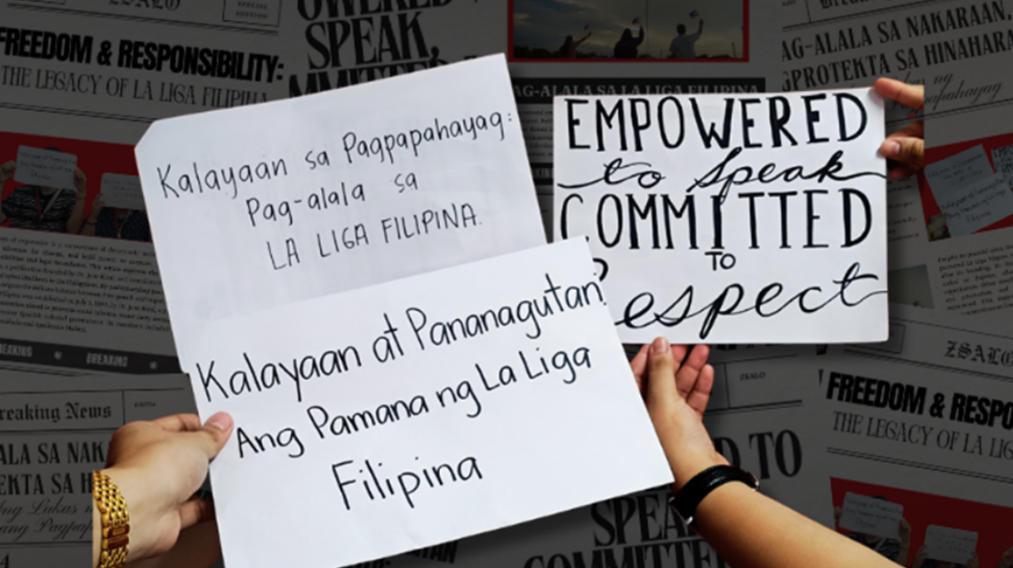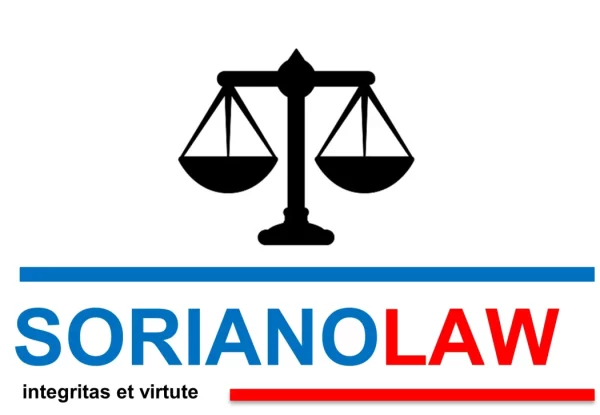Can you say or express whatever you want? –– Our Constitution guarantees the freedom of expression that protects us from the government impinging our rights to speak, oppose, criticize and express. But it does not give us the right to express whatever we want.
Freedom of expression is our spotlight this July because we commemorate the founding of La Liga Filipina which is an inspiration of the struggle for freedom of expression of Filipinos during the dark colonial times.
La Liga Filipina
La Liga Filipina was established on July 3, 1892, by National Hero Dr. Jose Rizal. The organization aimed to promote social reforms, foster unity among Filipinos, and fight against the oppressive Spanish colonial government. Its members included influential figures such as Andres Bonifacio and Apolinario Mabini.
The organization sought to:
- Unite Filipinos into a single, strong, and compact body.
- Protect and assist each other in cases of necessity.
- Defend against all violence and injustice.
- Encourage education, agriculture, and commerce.
- Study and implement reforms.
Despite its peaceful aims, the Spanish authorities perceived La Liga Filipina as a threat.
Just days after its founding, Dr. Rizal was arrested and exiled to Dapitan, effectively crippling the organization. Other members faced harassment and persecution, and the publication was suppressed.
Freedom of expression was heavily restricted under Spanish colonial rule. Publications like La Liga Filipina were seen as a threat to the colonial government’s authority.
Publications were banned and individuals who dared to speak out faced imprisonment, exile, or worse, execution.
Freedom of speech and expression curtailed
La Liga Filipina’s experience underscores the oppressive environment in which Filipinos struggled to exercise their right to free speech.
Freedom of speech and expression do not exist. Publications were censored and public speaking was curtailed, as the Spanish government imposed strict laws to prevent the spread of revolutionary and reformist ideas.
Publications were closely monitored, and any material deemed subversive was banned. Unfortunately, La Liga Filipinas’ struggles still resonate until the present day.
Modern-day suppression
In today’s context, despite being already free from the Spaniards, censorship and repression prevails. Non-conformist opinions and expressions of sentiments are being labeled as “politically motivated” and the messengers are labeled as "NPA" or "terrorists" for their critique of government policies or programs.
Criminalization of libel
Freedom of expression, while protected by the Philippine Constitution, is subject to limitations. The right to freely express one’s opinion is not absolute and it will never be, especially when the rights of others are curtailed. This concept is echoed through the criminalization of imputing defamatory statements under the law on libel and cyber libel.
Libel under the Revised Penal Code
As defined under our Penal Code, libel is a “public and malicious imputation of a crime, or a vice or defect, real or imaginary, or any act, omission, condition, status, or circumstance tending to cause the dishonor, discredit, or contempt of a natural or juridical person, or to blacken the memory of one who is dead.” (Art. 353, RPC)
Libel, thus, pertains to “paninirang puri” in Filipno parlance.
It punishes an imputation whether it be true or not as long as there is no good intention and justifiable motive for doing the same, subject to certain exceptions. (Art. 354, RPC)
The crime of libel may be committed by writing or other similar means (Art. 355, RPC), orally (Art. 358, RPC), by deed (Art. 359, RPC), and now, even virtually in cyberspace.
Libel under the Cybercrime Prevention Act of 2012
Cyber libel laws, such as the Cybercrime Prevention Act of 2012, extend traditional libel laws to cover online defamation, addressing the unique challenges posed by digital communication.
The expansive reach of digital platforms amplifies both the positive and negative impacts of speech.
Freedom and Criminal liability
Balancing the right to free speech with the need to protect individuals from harm is a complex legal and ethical challenge.
Legal precedents and high-profile cases in the Philippines shape the evolving landscape of freedom of expression in the digital age.
Under Sec. 4 of R.A. 10175, libel pertains to “the unlawful or prohibited acts of libel as defined in Article 355 of the Revised Penal Code, as amended, committed through a computer system or any other similar means which may be devised in the future.”
Interestingly, the penalty for the commission of cyber libel is graver than the traditional commission of the said crime. Naturally, it is indeed easier to state defamatory remarks online where restrictions are fewer.
Then vs. Now
The oppressive measures faced by La Liga Filipina in the 19th century find echoes in the challenges of modern-day freedom of expression. While the nature of communication has transformed with the advent of digital platforms, the core issue remains: balancing the right to free speech with the need to protect individuals from harm. Despite severe repression, La Liga Filipina’s legacy endured, laying the groundwork for subsequent revolutionary movements.
In the digital age, freedom of expression has taken on new dimensions. The internet and social media have transformed the way individuals express themselves, allowing rapid dissemination of information to a global audience. While these platforms democratize information sharing, they also present challenges in regulating content and addressing harmful speech.
Tips to avoid cyber libel crime
To navigate the complex landscape of modern communication, it is essential to exercise freedom of expression responsibly. Here are some practical tips:
- Attack the issue, not the person - Ad Hominem, focuses on the arguments of the statement and how to address them, and not on the author or speaker who is merely delivering the statements.
- Ensure Accuracy – Before sharing or publishing information, verify its accuracy. Use reputable sources and cross-check facts to avoid spreading misinformation.
- Avoid Harmful Speech – Steer clear of making unsubstantiated accusations or spreading information. Ensure your statements are grounded in verified information.
- Promote Constructive Dialogue – Engage in discussions respectfully and constructively, particularly in online forums. Avoid using inflammatory language or making personal attacks.
- Know the Legal Limits – Familiarize yourself with the legal boundaries surrounding speech. Understand the implications of libel and cyber libel laws to avoid inadvertent violations.
- Think Before You Post – Reflect on the potential impact of your words before posting online. Consider the broader consequences and aim to contribute positively to the public discourse.
By understanding the historical context and the contemporary legal framework, we can better appreciate the responsibilities that come with this fundamental right. As we navigate the digital age, it is crucial to exercise our freedom of expression thoughtfully and responsibly, honoring the sacrifices of those who fought for this right while respecting the rights of others.

